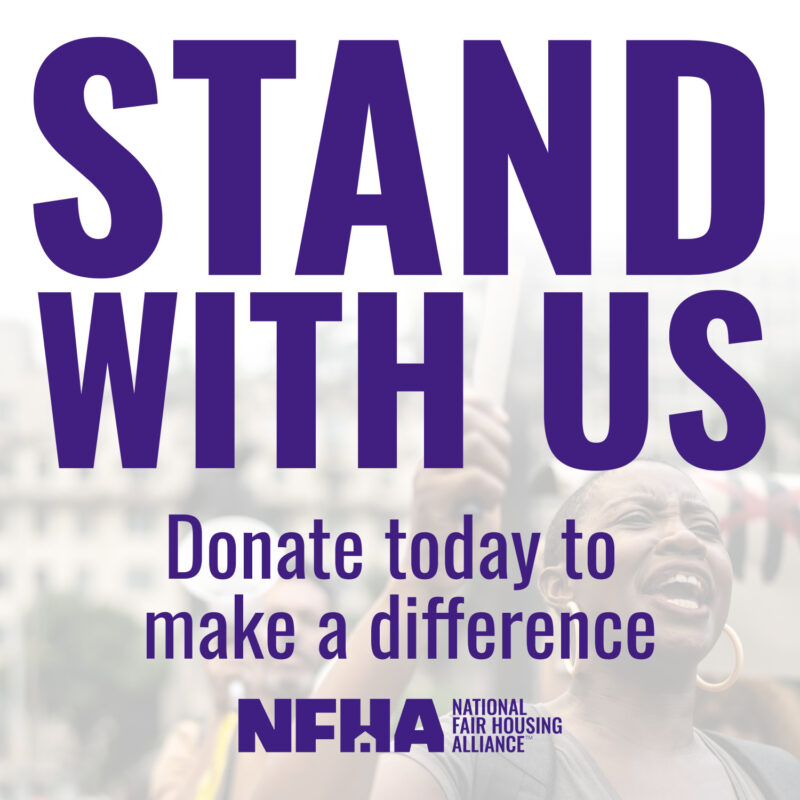National Fair Housing Alliance Condemns HUD’s Evisceration of Civil Rights Tool to Address Systemic Racism
FOR IMMEDIATE RELEASE
September 4, 2020
Contact: Izzy Woodruff | 202-898-1661 | IWoodruff@nationalfairhousing.org
National Fair Housing Alliance Condemns HUD’s Evisceration of Civil Rights Tool to Address Systemic Racism
HUD’s new rule guts an important civil rights protection for people of color, women, immigrants, families with children, people of faith, LGBTQ individuals, people with disabilities and other vulnerable communities.
Washington, D.C. — Today, the Department of Housing and Urban Development (HUD) released a final rule that severely weakens the civil rights legal tool under the Fair Housing Act known as “disparate impact.” These changes, which The Trump administration proposed in an earlier draft, generated more than 45,000 comments from civil and human rights organizations, data scientists, legal experts, housing and financial services providers, disability rights groups, faith-based institutions, and others. The new rule will make it eminently harder to challenge systemic racism by housing providers, financial institutions, and insurance companies that deprive people of the services and opportunities they need.
“This is the worst possible time for HUD to gut civil rights protections. We are grappling with a triple pandemic — the COVID-19 health crisis, the ensuing economic crisis, and the crisis of racism that has plagued us since the beginnings of this nation. Every day we are witnessing travesties linked to increased homelessness and evictions, food instability, healthcare disparities, and severe job loss. At the same time, police violence against people of color has reached an epidemic level,” said Lisa Rice, president and CEO of the National Fair Housing Alliance (NFHA). “These national crises are exacerbated by longstanding disparities rooted in segregation and discrimination. Housing segregation fuels COVID-19’s unequal outcomes by limiting access to health care, healthy foods, clean water, a pollution-free environment, safe jobs, quality credit, and transportation that minimizes health risks. Housing segregation contributes to unfair policing practices whereby communities of color are over-policed with violent and harmful results, while predominantly white neighborhoods are protected and served. Now more than ever, we need to rely on longstanding civil rights enforcement tools to effectively address the systemic discrimination underlying these crises and ensure equal housing opportunity for everyone. The National Fair Housing Alliance will use every available tool, including legal action, to make sure the Trump administration’s deleterious rule is withdrawn.”
Based on our initial analysis, HUD’s final rule provides:
- Overwhelming obstacles to prove discrimination: Victims of discrimination will face a drastically higher burden to prove a disparate impact claim under the Fair Housing Act, making it virtually impossible to succeed. Perpetrators of housing discrimination need only claim, without proof, that a challenged policy is valid while victims, without the same access to information, are required to debunk a slew of excuses.
- Profits above all else: Language in the rule suggests that a policy that is profitable could be immune from challenge for its discriminatory impact — with the burden on discrimination victims to show that a company can make at least as much money without discriminating.
- Predictive Analysis: HUD’s rule encourages lenders to adopt and maintain algorithms even if the lenders know they have a discriminatory effect.
- Systemic Discrimination: The disparate impact tool helps to eliminate the vestiges of segregation and discrimination. HUD’s rule could prevent victims of discrimination from holding companies accountable for policies that perpetuate systemic discrimination.
In essence, Trump’s new rule further exacerbates racial inequality, makes our communities less safe, undermines our economic prosperity, and lessens our children’s ability to succeed.
Systemic racism continues to be a significant problem in this country. Continued protests have forced a national spotlight on the issue. The number of housing discrimination complaints in 2018 went up by almost nine percent from the previous year to 31,202, the highest level it has been since NFHA began collecting complaint data in 1995. Hate crimes on the basis of race, ethnicity, religion, or sexual orientation occur at extraordinarily high rates, and physical violence connected to hate crimes is on the rise as well.
The Fair Housing Act contains a powerful tool for addressing systemic racism by prohibiting the use of policies that seem neutral in theory but can unfairly exclude certain groups or segregate particular communities. Through disparate impact claims, which courts have allowed for more than 45 years, people can challenge unjustified policies or practices that disproportionately harm people protected by the Fair Housing Act. Use of disparate impact was affirmed by the Supreme Court in a 2015 ruling in Texas Dept. of Housing & Community Affairs v. Inclusive Communities Project. The Court made it clear that disparate impact claims must remain viable in order to fulfill “the Fair Housing Act’s continuing role in moving the nation toward a more integrated society.”
Click here for some examples of harmful policies that can be challenged using the disparate impact tool.
NFHA strongly urges the Trump administration to immediately rescind this new rule and avoid causing further harm to millions of Americans during these extraordinarily perilous times. Visit DefendCivilRights.org to learn more and find out how you can speak out against this devastating attack on civil rights.
###
About The National Fair Housing Alliance
Founded in 1988, NFHA is a consortium of more than 200 private, nonprofit fair housing organizations, state and local civil rights agencies, and individuals from throughout the United States. Headquartered in Washington, D.C., NFHA works to eliminate housing discrimination and ensure equal housing opportunity for all people through leadership, education, outreach, membership services, public policy initiatives, community development, advocacy, and enforcement.
